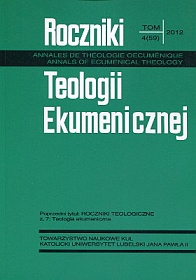Co się stało z „sola Scriptura”? Jak posłużono się Biblią w walce o święcenia prezbiteratu i episkopatu dla kobiet we Wspólnocie Anglikańskiej
Abstrakt
Autor artykułu poddaje badaniu tradycyjne znaczenie formuły sola Scriptura w Kościele anglikańskim w epoce Reformacji i konfrontuje je z dzisiejszym używaniem Biblii w procesie podejmowania decyzji w kwestiach życia kościelnego i doktryny. Próbą takiego procesu jest przyjęcie święceń kobiet do prezbiteratu i episkopatu we Wspólnocie Anglikańskiej, szczególnie zaś w Kościele Anglii.
Ponieważ wyznania chrześcijańskie są wzajemnie powiązane, decyzje podejmowane w jednym wyznaniu mają rzeczywisty wpływ na resztę chrześcijaństwa. Dowodzi tego istotowa zmiana wprowadzona do dialogu anglikańsko-rzymskokatolickiego przez jednostronne decyzje o święceniu kobiet podjęte przez anglikanów. Kwestionowane decyzje były jednak podjęte na bazie niewłaściwej hermeneutyki tekstów biblijnych i w oparciu o założenia prowadzące do niebezpiecznego skrótu myślowego. Tak oto linia argumentacji wyprowadzona z Biblii przez anglikanów pomija to, o co w rzeczywistości chodzi Kościołowi katolickiemu. Ważny dla katolików argument, że Kościół nie może zmieniać tego, co jest wolą Chrystusa, został ominięty poprzez przesunięcie tego zagadnienia z prawa Bożego do prawa ludzkiego.
Bibliografia
Anglicanism and the Bible. Ed. F.A. Borsch. Wilton 1984.
Anglican-Roman Catholic International Commission: The Agreed Statements: Eucharistic Doctrine 1971. Ministry and Ordination 1973. London 1973.
Authority in the Church. A Statement on the Question of Authority, its Nature, Exercise and Implications Agreed by the Anglican-Roman Catholic International Commission. London 1976.
The Book of Common Prayer. London 1844.
Bray G.L.: Sacraments and Ministry in Ecumenical Perspective, “Latimer Studies” 18, Oxford 1984.
De Mendieta A.: Rome and Canterbury. A Biblical and Free Catholicism. London 1962.
Dillenberger J., Welch C.: Protestant Christianity. New York—London 19882.
Gift of Authority. Authority in the Church III. An Agreed Statement by the Anglican-Roman Catholic International Commission. London 1999.
John Paul II: Encyclical letter «Ut unum sint» of the Holy Father, John Paul II on commitment to ecumenism. Vatican City 1995.
Kasper W.: Mission of Bishops in the Mystery of the Church: reflections on the question of ordaining women to Episcopal office in the Church of England. An address given to the Church of England Bishops’ Meeting, 5 June 2006. http://www.archbishopofcanterbury.org/articles.php/1485/cardinals-address-on-women-bishops-a-clear-and-helpful-contribution-archbishop [access on 5th Jan. 2013].
Lambert B.: Ecumenism: Theology and History. London 1967.
New Revised Standard Version Bible, Oxford 1995.
The Ordination of Women to the Priesthood. A Digest of the Second Report by the House of Bishops (GS 829). London 1990.
Wand J.W.C.: What the Church of England Stands for: A Guide to its Authority in the Twentieth Century. London 1951.
Williams R.: Archbishop’s address at a Willebrands Symposium in Rome. 19th November 2009. http://www.vatican.va/roman_curia/pontifical_councils/chrstuni/angl-comm-docs/rc_pc_chrstuni_doc_20091119_williams-willebrands_en.html [access on 5th Jan.2013].
Women in the Anglican Episcopate. Theology, Guidelines, and Practice. The Eames Commission and the Monitoring Group Reports. Toronto 1998.
Yarnold G.D.: By What Authority? Studies in the Relations of Scripture, Church, and Ministry. London 1964.

